How comfortable are you with making mistakes and admitting failure? Is it easy for you or do you avoid admitting mistakes and pass blame? I think we all have come across different types of people when it comes to dealing with failure. Some can just roll with it, brushing mistakes off like the lint off their shoulder saying, “Eh, whatever,” while others hang on to each mistake or failure, over analyzing them, replaying them over and over in their mind, questioning and self-doubting. And then there are some who totter between the two. I am certainly not the type to let mistakes just roll off my shoulders, but I have come a long way with being more mindful about letting myself go through the uncomfortable feelings and stages of the mistake making process and teaching my students how to go through it as well. Afterall, it is perfectly normal to experience failure at some point in your life, or at many points, especially failure that needs to happen to open doors to great ideas, opportunities, possibilities and adventures. Failure should be expected. So why it is difficult to own up to and accept our mistakes? Is it because it bruises our ego, depletes our confidence, and perhaps gives us a feeling of defeat? Or have we not enough experiences with going through the process of making mistakes in a mindful way, focusing on the awareness and acceptance in the present moment?
All too often children, as well as adults, struggle with making mistakes and the idea of failure. Failure is tough to swallow, especially for kids. It seems that parents are intervening more than ever these days. I hear stories about parents arguing with teachers over failing grades demanding them to be changed, questioning teachers grading policies and making excuses for their children when the quality of work and effort just wasn’t up to par. That’s concerning because in the real world, those kids will not have their parents to defend them when they make mistakes or when failure comes a knockin’ at their front door in their professional and personal life.
Making mistakes is part of life. Failure is part of the journey. It’s all part of the learning process and it has its benefits. “When teachers allow students to fail – and to learn from their mistakes- they teach more than the standardized curriculum; they teach resilience, confidence and strength. They demonstrate that people don’t always win in life and that it’s okay” (Hope & Wade King, 2017). It teaches children to take risks and to work hard. It thickens their skin and prepares them for future success. I saw this first hand recently with my 8 year old son. In his karate class he was testing for a stripe on his belt and failed it twice. He was a bit disappointed but he didn’t give up. He came home and practiced his form over and over until it was just right. During his next class, he raced in to test with confidence and earned his stripe. He was so excited, beaming from ear to ear, because he earned something from hard work and perserverance. A feeling you get when achieving success after failure. A proud moment!
I saw many of my young elementary students break down when they made mistakes or failed, throwing inner and outer tantrums, becoming easily frustrated, shutting down, and showing little or no perseverance. And then there were some students that had so much anxiety and fear of failure that they struggled with just about anything and everything, falling right into either the perfectionist or procrastination pit. We created a class motto to change their perspective about making mistakes and posted it in our classroom.
We read this motto during our daily morning meeting practicing mindfulness as we embarked upon each and every school day, every challenge and every obstacle. We learned to be comfortable with our mistakes and to build each other up. Afterall, we were a team- we worked as a team, we played as a team and we learned as a team- through mistakes and all. We focused on the importance of the process of making mistakes and how it shaped us into lifelong learners and developed a growth mindset.
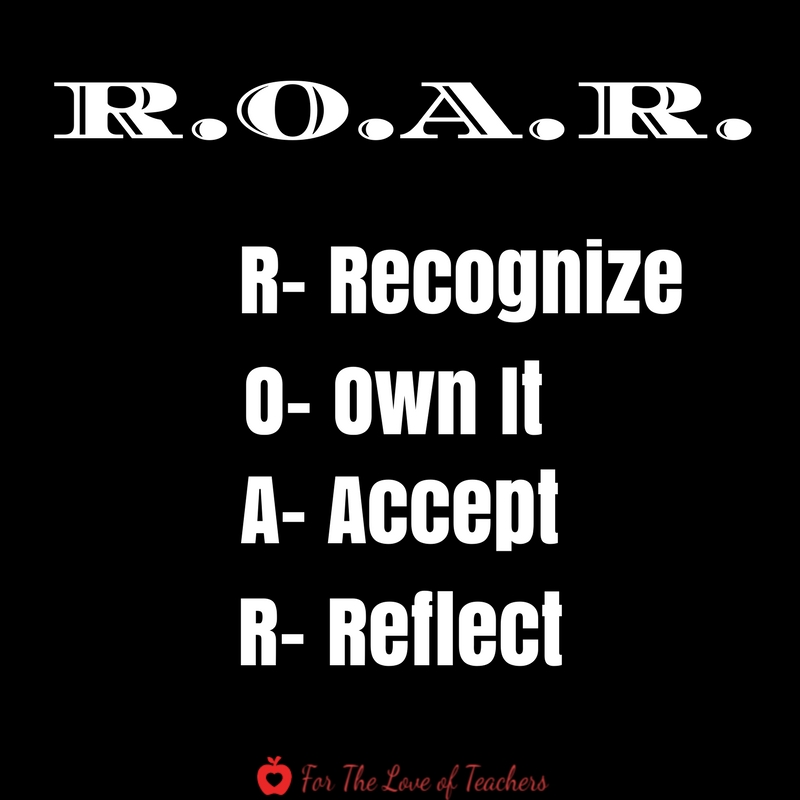
Recognize
Recognizing that failure is normal and is part of the learning process is so important to teach children at a young age. So many kids are used to being reprimanded for failing and fear getting into trouble. They shut down or procrastinate from the start, or don’t follow through with the task at hand, often leading to avoidance or blame. Kids need to know what it feels like to fail. They need to learn how to cope with the uncomfortable emotions that failure brings. Getting comfortable with these uncomfortable feelings helps us to persevere through them.
Own it
Owning our mistakes, as children and adults, is also so important. Taking responsibility for our actions and words is key in this process. I know as teachers and parents we want to take away the sting of a mistake, but in the long run that doesn’t help our children in the real world. Owning brings forth accountability and change.
Accept
Accepting our mistakes and failures helps us to move forward. Dwelling on mistakes from the past, questioning and self-doubting distracts us from the present moment. This is where we can again practice mindfulness. Mindfulness is a particular state of consciousness that involves awareness and acceptance of whatever is happening in the present moment (Jennings, 2015). Focusing on and accepting failure at the present moment, not seeing it as an obstacle, but more like a challenge in an obstacle course, allows us to think clearly using our wits and skills to problem solve through it. Acceptance instills a mindset of not surrendering to failure, but learning from it and moving forward in a positive way.
Reflect
Reflecting is a necessary practice to do with young children daily and needs a lot of modeling and guidance. What caused the mistake and how could I reflect, fix it and move on? How could I grow from this? What did I learn? What could or would I do differently next time? Students must learn how to reflect and to recover from their mistakes so they could move forward. Having students take time for daily reflection and setting SMART goals helps students work through their mistakes and toward success.
Check out my Failure Learning Project to teach your students how to R.O.A.R. through failure.
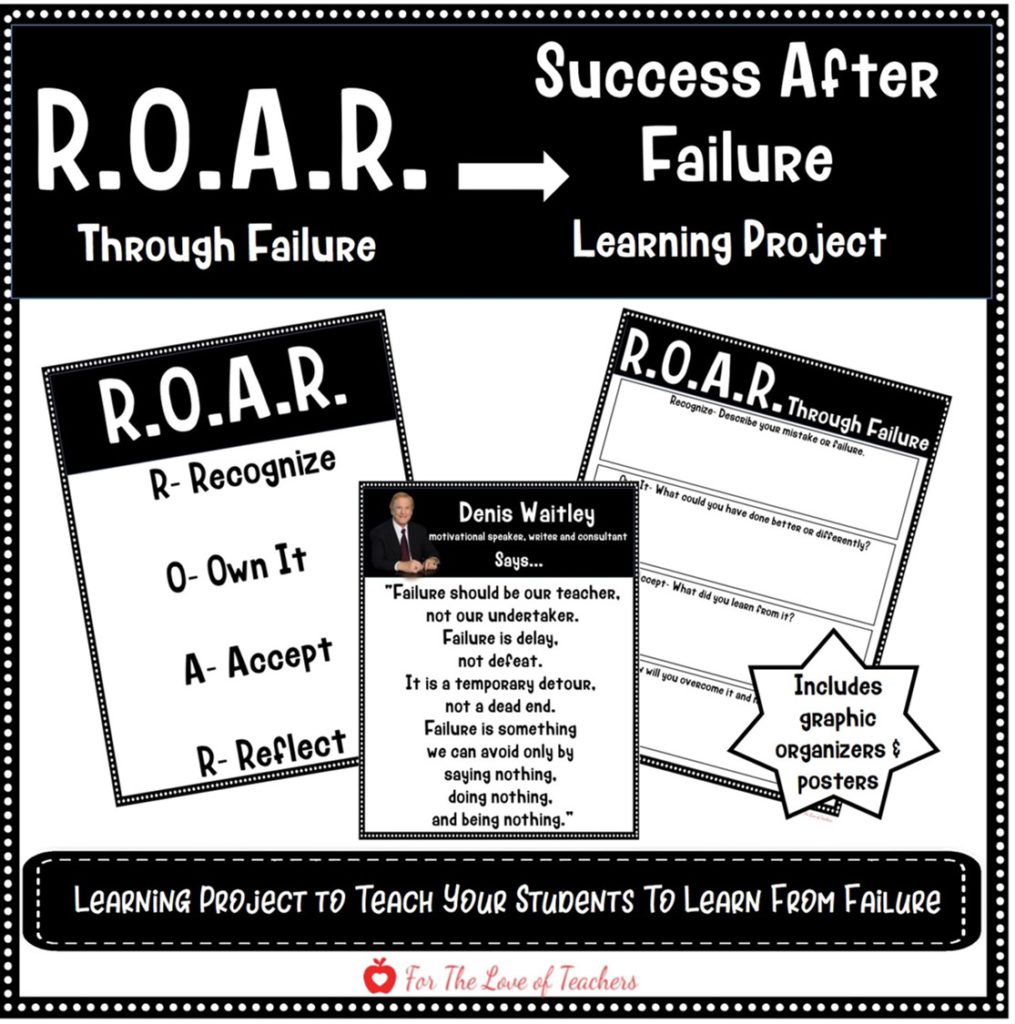
We must remember as educators that as we teach content, we teach problem solving in every sense. STEM education alone takes students through an intricate process of rethinking, redesigning, replanning when there is a “mistake” in the process that fails to get to the desired end result. In everyday life, within every profession, there are so many decisions that we have to make in just one day and there’s bound to be mistakes and failure, but if we become mindful of the process we can and will overcome it bringing forth new opportunities for learning and growth.
So let’s “embrace the tears and bring on the breakdowns” (Hope & Wade King, 2017) and empower children to R.O.A.R. through their mistakes and failures so they can practice mindfulness and perseverance to be successful in the future.
What type of person are you when it comes to mistakes? Do you brush them off, over analyze or are somewhere in between? How do you teach students to get passed their mistakes and to learn from failure?
Related posts:
Changing the Mindset of the Perfectionist Teacher
How to Identify and Support Perfectionists In Your Classroom
Other reads:
Why Your Students Have the Right To Fail By Lepre’s Learning Log
Need support? Visit the Forums to ask questions, share ideas and products. There are so many fantastic ideas and products posted there so be sure to check them out.
Follow me to be notified when new resources are uploaded to the Shop and join the email list to receive the latest and greatest updates, posts, and monthly freebies!!
If you like it, then pin it!



Christine Weis is a passionate educator, classroom management coach, wife, and mom of two busy boys. She enjoys teaching, writing, and creating resources for teachers.
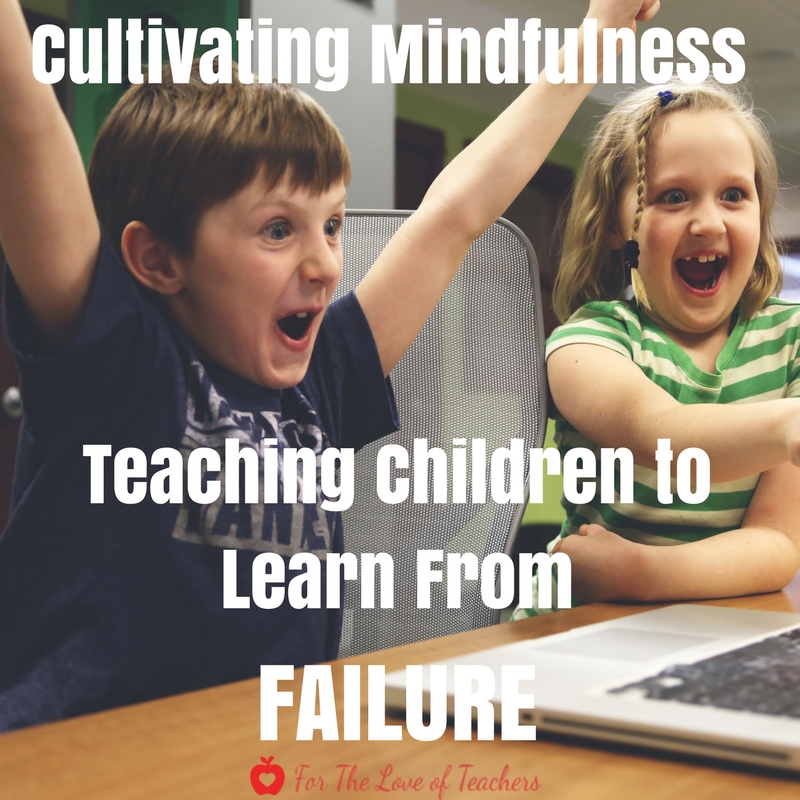
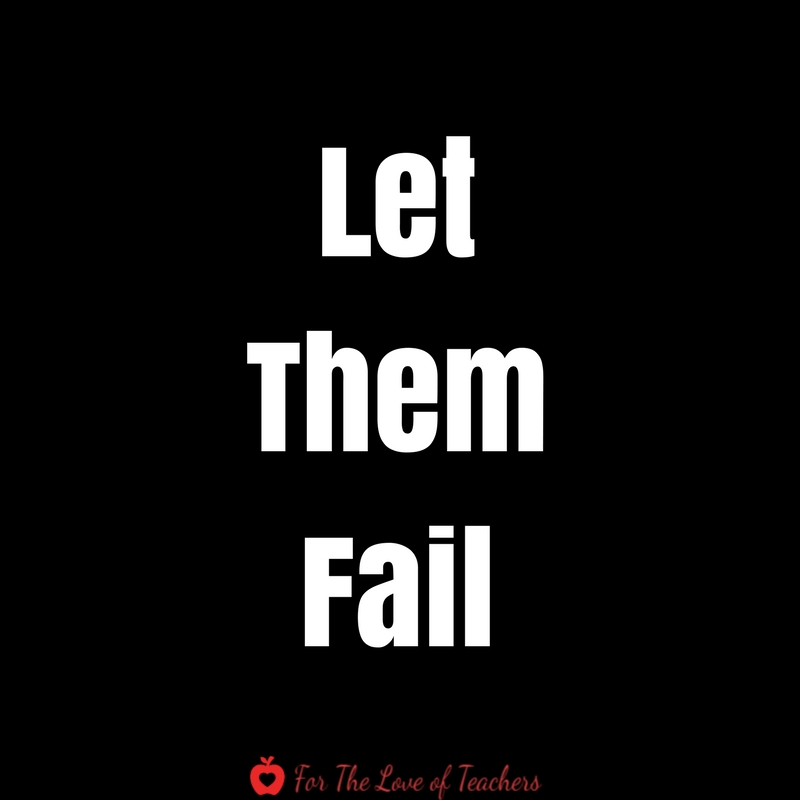
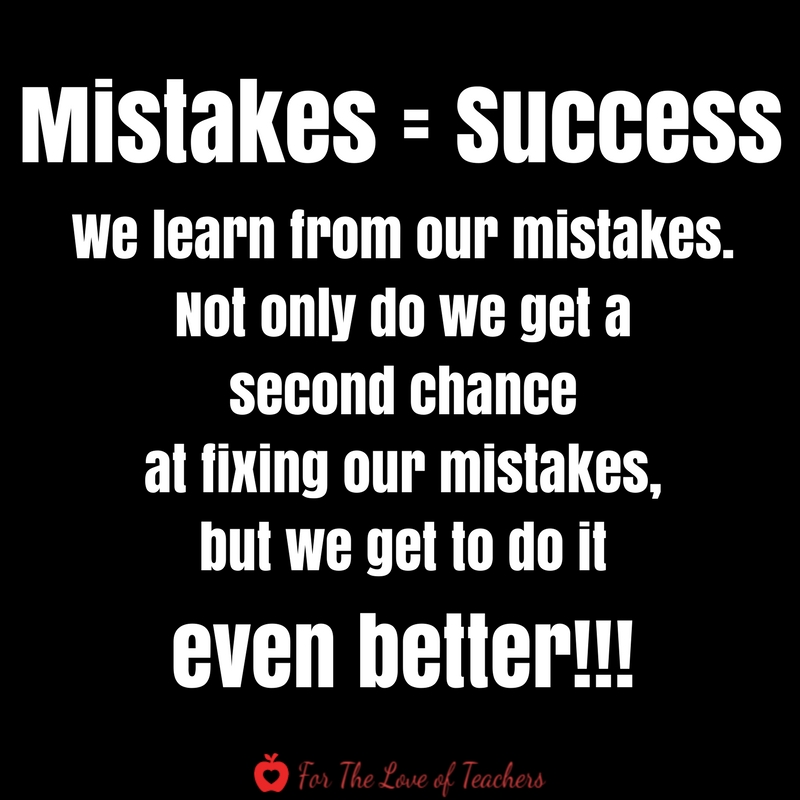
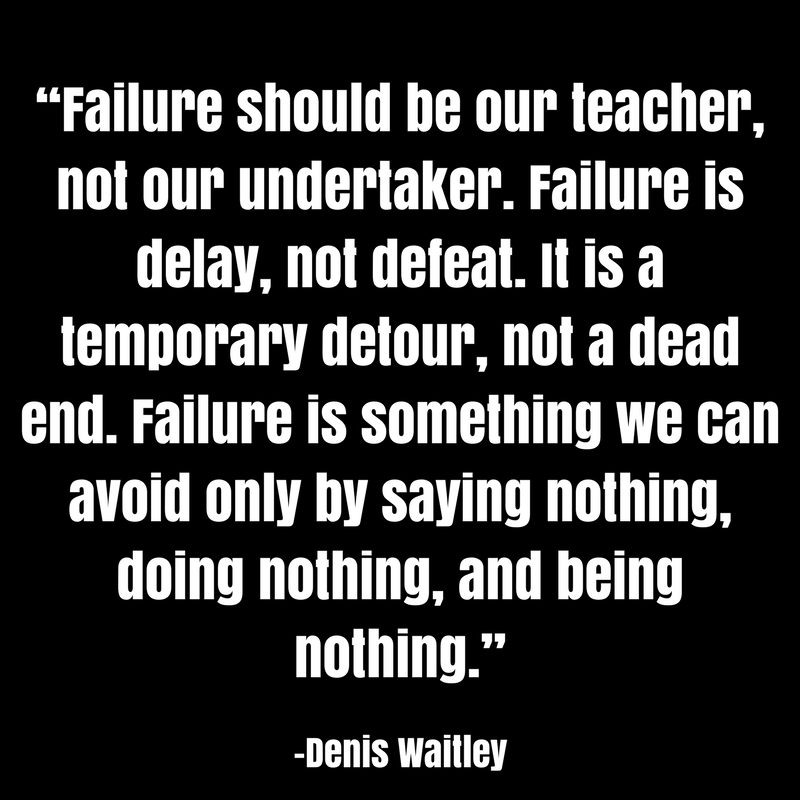




simply great , useful post. thanks
Thanks for reading! 🙂
Christine at For The Love of Teachers
I love this post! I will be using R.O.A.R. with my children!
Thank you!! That’s awesome! It’s a great acronym to use and easy to remember. Thanks for reading!
Christine at For The Love of Teachers
I am loving the ROAR acronym! It’s perfect! Thank you for sharing!
Thanks…me too! Acronyms stick and this one really help students to think about the mistake making process. Thanks for reading!
Christine at For The Love of Teachers
I could not agree more. Let them learn from failure. If they keep winning, not that should not, if you hurt them quite bad if they fail once. I teach children and what I’ve seen if that when they fail at something, it motivates them even more to suceed.
Sometimes failure does motivate. It motivates me for sure. Not surrendering to failure is so important, plus I like a good challenge. 😉 Thanks for reading!
Christine at For The Love of Teachers
I am not a parent myself but I am a strong believer in letting kids fail so they can learn to pick themselves up, try again and learn from their mistakes!! It’s part of life! Great post.
Yes…it’s a valuable and important lesson in life. We must remind children, and adults, that it is okay to make mistakes and to fail. It’s all about what we learn from it and how we’ll grow. Thanks for reading!
Christine at For The Love of Teachers
I can admit that I do have a hard time admitting that I have failed in anything. But Oprah and Bill Gates or any famous person has failed and they didn’t stop trying. That’s what I say to myself, don’t stop and keeping on going,
I think we all do BUT failure does lead to great things. Oprah and Bill Gates are amazing examples of this. Success didn’t come to anyone overnight or easily. It takes hard work and learning from mistakes along the way. It’s all about the ride!!! Thanks for reading Luci!
Christine at For The Love of Teachers
This post makes me want to give you the biggest virtual HUG!
First, I love your acronym R.O.A.R.!!! You need to make this a poster and sell it on TpT! This would be a great reminder for us AND our students to be mindful of our emotions and expectations of ourselves. This is especially prudent during testing when the pressure trickles down from the top, and the ones who suffer the most are our kids!
Also, at the beginning of the year, I warn both my students and parents that their child will most likely do poorly the first quarter of 7th grade, and it’s ABSOLUTELY OK! This is actually the BEST time for them to fail so that they can learn what does and doesn’t work in middle school! They don’t always take it so well, which leads to some interesting conversations over grades.
I had a parent come to me because their student had 89.9%, and they want me to offer extra credit. It blew my mind what they’re communicating to their child about what’s truly important in school and in life. I can’t believe that a B+ is unacceptable to them, and I can’t believe that the parent felt the need to disrupt their student’s learning for the sake of a grade.
Thank you again for sharing this wonderful post!
Thanks so much Kim for your thoughtful comment. I’m in the process of creating my ROAR resource so that other teachers could use it. It has really helped my students and myself work through and learn from failure. It’s tough for anyone to fail at any point in our lives and that’s why it is so important to teach, model and guide our students through the process. Sometimes our job is to educate parents about this too. I kept this posted in my classroom so parents knew my expectations, even if theirs were a bit unreasonable or unrealistic. Thanks for reading Kim!!! 🙂
Christine at For The Love of Teachers
Great blog 🙂 thank you for sharing !!! we learn from the mistakes. It’s important to acknowledge that failure is not the end.
Thank you Nisha! Great point…failure is NOT the end..It’s just the beginning! 🙂 Thanks for reading!
Christine at For The Love of Teachers
I totally agree that failure is part of each of our journeys. It’s such an important part of learning and humility. I still struggle with it, but it seems to be a life-long learning process.
It sure is! Teaching students about failure and being comfortable with it at a young age is so important. I think we all struggle with it at some point. I agree that it is a life long process. Thanks for reading!
Christine at For The Love of Teachers
There is so much truth to this post! I especially like the part about reflecting. We do so much reflecting in our classroom. almost after each activity. It’s so important!
Reflecting is so important for everyone. Reflecting helps me self improve. It helps my students too but it must be taught, modeled and practiced. Thanks for reading!
Christine at For The Love of Teachers
Great post. We put far too much emphasis on getting everything perfect first time round. In reality, failure in our youth is a great way to learn and to reflect upon challenges. If you never fail at anything then how can you expect to improve?
So true…we can’t self improve without failure. It really is true that we learn from our mistakes. Thanks for reading!
Christine at For The Love of Teachers
As someone who is practicing mindfulness, I think it’s nice to pass it onto the little ones as well.. I have seen kids who dont react well with failure and who are extremely competitive… while there’s nothing wrong with this mindset, Life is about accepting mistakes and failures as part of the improvement process…
Exactly! I couldn’t agree more. Learning this as a young age gets us comfortable with failure. Thanks for reading!
Christine at For The Love of Teachers
I love what you said about reflection. I think that can be applied to life and mistakes, no matter your age. Every time something in my goes “wrong”, I find it very beneficial to reflect on what I learned from the situation, it helps me move through the issue.
Reflection applies to all of us and yes it is extremely helpful in moving forward. It is a lifelong, useful practice. Thanks for reading!
Christine at For The Love of Teachers
This is so true, mistakes are both a part of life and a learning experience! I also love your acronym ROAR!
They sure are! Thank you! Acronyms helps us to remember just about anything and everything! Thanks for reading!
Christine at For The Love of Teachers